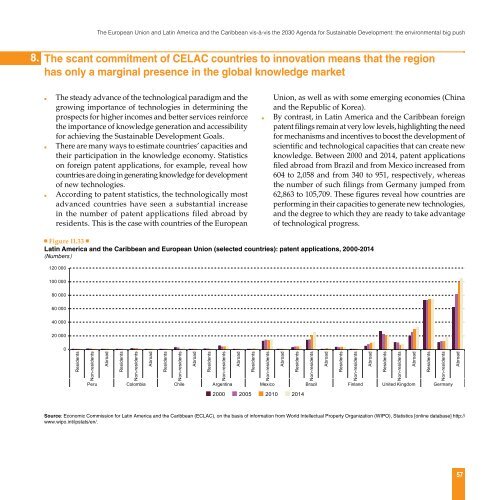La Unión Europea y América Latina y el Caribe ante la Agenda 2030 para el Desarrollo Sostenible: el gran impulso ambiental
Desde todas las regiones del planeta se observa con preocupación el aumento de la desigualdad global y la agudización de la crisis ambiental, especialmente en el caso del cambio climático. Frente a la complejidad de la situación, la comunidad internacional se ha movilizado a través de un extenso debate multilateral para ofrecer una respuesta amplia y ambiciosa. En los últimos meses se han puesto en marcha una serie de acciones colectivas que apuntan hacia un nuevo paradigma de desarrollo más sostenible e igualitario. En septiembre de 2015, la Asamblea General de las Naciones Unidas aprobó la Agenda 2030 para el Desarrollo Sostenible y los 17 Objetivos de Desarrollo Sostenible (ODS), con el reconocimiento de que el cambio climático y el desarrollo son inseparables. En esta línea, en diciembre de 2015 se aprobó el Acuerdo de París, en el que tanto naciones industrializadas como países en desarrollo se comprometen a gestionar la transición hacia una economía baja en carbono.
Desde todas las regiones del planeta se observa con preocupación el aumento de la desigualdad global y la agudización de la crisis ambiental, especialmente en el caso del cambio climático.
Frente a la complejidad de la situación, la comunidad internacional se ha movilizado a través de un extenso debate multilateral para ofrecer una respuesta amplia y ambiciosa. En los últimos meses se han puesto en marcha una serie de acciones colectivas que apuntan hacia un nuevo paradigma de desarrollo más sostenible e igualitario. En septiembre de 2015, la Asamblea General de las Naciones Unidas aprobó la Agenda 2030 para el Desarrollo Sostenible y los 17 Objetivos de Desarrollo Sostenible (ODS), con el reconocimiento de que el cambio climático y el desarrollo son inseparables. En esta línea, en diciembre de 2015 se aprobó el Acuerdo de París, en el que tanto naciones industrializadas como países en desarrollo se comprometen a gestionar la transición hacia una economía baja en carbono.
Create successful ePaper yourself
Turn your PDF publications into a flip-book with our unique Google optimized e-Paper software.
The <strong>Europea</strong>n Union and <strong>La</strong>tin America and the Caribbean vis-à-vis the <strong>2030</strong> <strong>Agenda</strong> for Sustainable Dev<strong>el</strong>opment: the environmental big push<br />
8. The scant commitment of CELAC countries to innovation means that the region<br />
has only a marginal presence in the global knowledge market<br />
■■<br />
■■<br />
■■<br />
The steady advance of the technological <strong>para</strong>digm and the<br />
growing importance of technologies in determining the<br />
prospects for higher incomes and better services reinforce<br />
the importance of knowledge generation and accessibility<br />
for achieving the Sustainable Dev<strong>el</strong>opment Goals.<br />
There are many ways to estimate countries’ capacities and<br />
their participation in the knowledge economy. Statistics<br />
on foreign patent applications, for example, reveal how<br />
countries are doing in generating knowledge for dev<strong>el</strong>opment<br />
of new technologies.<br />
According to patent statistics, the technologically most<br />
advanced countries have seen a substantial increase<br />
in the number of patent applications filed abroad by<br />
residents. This is the case with countries of the <strong>Europea</strong>n<br />
■■<br />
Union, as w<strong>el</strong>l as with some emerging economies (China<br />
and the Republic of Korea).<br />
By contrast, in <strong>La</strong>tin America and the Caribbean foreign<br />
patent filings remain at very low lev<strong>el</strong>s, highlighting the need<br />
for mechanisms and incentives to boost the dev<strong>el</strong>opment of<br />
scientific and technological capacities that can create new<br />
knowledge. Between 2000 and 2014, patent applications<br />
filed abroad from Brazil and from Mexico increased from<br />
604 to 2,058 and from 340 to 951, respectiv<strong>el</strong>y, whereas<br />
the number of such filings from Germany jumped from<br />
62,863 to 105,709. These figures reveal how countries are<br />
performing in their capacities to generate new technologies,<br />
and the degree to which they are ready to take advantage<br />
of technological progress.<br />
Figure II.33<br />
<strong>La</strong>tin America and the Caribbean and <strong>Europea</strong>n Union (s<strong>el</strong>ected countries): patent applications, 2000-2014<br />
(Numbers)<br />
120 000<br />
100 000<br />
80 000<br />
60 000<br />
40 000<br />
20 000<br />
0<br />
Residents<br />
Non-residents<br />
Abroad<br />
Residents<br />
Non-residents<br />
Abroad<br />
Residents<br />
Non-residents<br />
Abroad<br />
Residents<br />
Non-residents<br />
Abroad<br />
Residents<br />
Non-residents<br />
Abroad<br />
Residents<br />
Non-residents<br />
Abroad<br />
Residents<br />
Non-residents<br />
Abroad<br />
Residents<br />
Non-residents<br />
Abroad<br />
Residents<br />
Non-residents<br />
Abroad<br />
Peru Colombia Chile Argentina Mexico Brazil Fin<strong>la</strong>nd United Kingdom Germany<br />
2000 2005 2010 2014<br />
Source: Economic Commission for <strong>La</strong>tin America and the Caribbean (ECLAC), on the basis of information from World Int<strong>el</strong>lectual Property Organization (WIPO), Statistics [online database] http://<br />
www.wipo.int/ipstats/en/.<br />
57


















